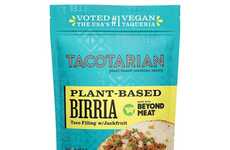
The Vegetarian Butcher Brought the Plant-Based Whopper to LATAM
Colin Smith — August 20, 2024 — Eco
References: foodingredientsfirst
The introduction of the Plant-Based Whopper by The Vegetarian Butcher and Burger King in Latin America and the Caribbean is a testament to the region's increased investment in vegan and vegetarian options. Historically, vegan and vegetarian options have been limited in these markets, making this launch particularly noteworthy. The Plant-Based Whopper, which has already seen success in other regions, aims to cater to the growing demand for plant-based alternatives among consumers who are increasingly conscious of health and environmental impacts. This expansion aligns with global trends towards flexitarian diets, where individuals seek to reduce meat consumption without compromising on taste and texture.
This rollout includes several countries such as Mexico, Costa Rica, Colombia, and the Dominican Republic, among others. By introducing the Plant-Based Whopper, Burger King and The Vegetarian Butcher are addressing a gap in the market, providing more inclusive menu options for vegetarians, vegans, and flexitarians. This move not only broadens the appeal of Burger King’s offerings but also supports Unilever’s ambition to significantly grow its plant-based meat and dairy alternatives sector. The expansion into Latin America and the Caribbean is a strategic step towards meeting the increasing global demand for sustainable and high-quality plant-based foods.
Image Credit: Unilever, Burger King
This rollout includes several countries such as Mexico, Costa Rica, Colombia, and the Dominican Republic, among others. By introducing the Plant-Based Whopper, Burger King and The Vegetarian Butcher are addressing a gap in the market, providing more inclusive menu options for vegetarians, vegans, and flexitarians. This move not only broadens the appeal of Burger King’s offerings but also supports Unilever’s ambition to significantly grow its plant-based meat and dairy alternatives sector. The expansion into Latin America and the Caribbean is a strategic step towards meeting the increasing global demand for sustainable and high-quality plant-based foods.
Image Credit: Unilever, Burger King
Trend Themes
1. Flexitarian Diet Popularity - With more consumers adopting a flexitarian approach, the demand for diverse and appetizing plant-based food options is rising rapidly.
2. Sustainable Food Solutions - As environmental concerns grow, there is a significant shift towards food products that reduce carbon footprints and resource usage.
3. Regional Expansion of Vegan Products - The introduction of plant-based meat alternatives in historically under-served regions showcases the increasing global interest in vegan and vegetarian diets.
Industry Implications
1. Quick-service Restaurants - The fast food industry is evolving by incorporating plant-based options to appeal to health-conscious and environmentally aware consumers.
2. Plant-based Food Manufacturing - Manufacturers of meat alternatives are experiencing growth opportunities by expanding into new markets with a demand for sustainable food products.
3. Food Retail and Distribution - Distributors and retailers are poised to benefit from increasing consumer interest in plant-based options, driving the need for diverse product offerings.
8.4
Score
Popularity
Activity
Freshness
























